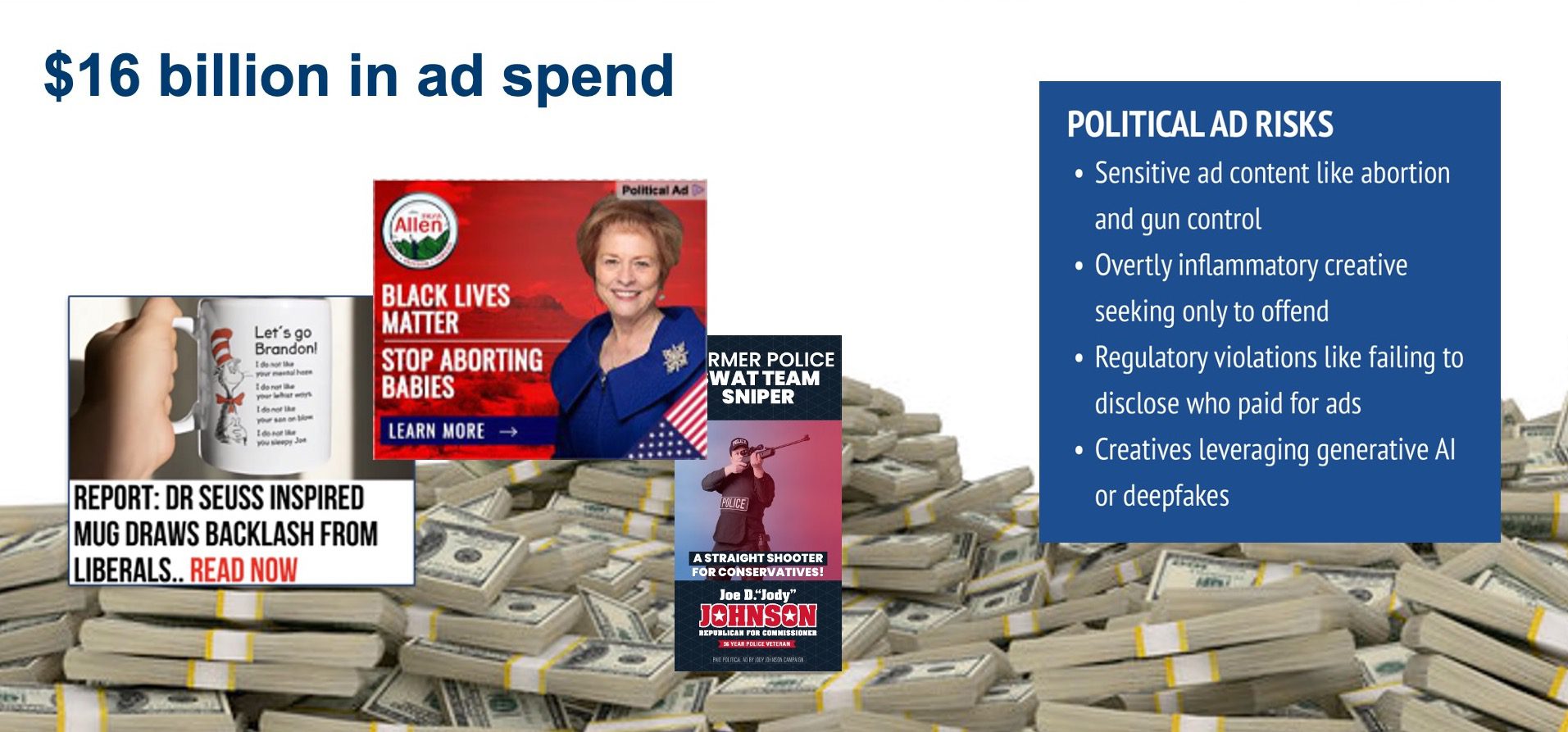
While political ads promise a revenue windfall for beleaguered publishers and adtech, the pitfalls must be managed
As we approach the 2024 US general election, the digital media and adtech industry is abuzz with the prospect of a significant political ad spend, estimated at $15.916 billion. This forecast comes as a refreshing change after a period of economic challenges that dampened advertising expenditures. However, the optimism is tempered by a mix of anxiety and risk associated with this lucrative opportunity.
The Challenges Ahead: Content, Compliance, and Democracy
The current political climate is fraught with contention, further complicated by the emergence of generative AI. This technology brings the risk of disseminating objectionable or inflammatory content, sparking concerns over the spread of disinformation through advertising. The potential for ads to feature sensitive topics such as abortion, gun control, and immigration with inflammatory content is high. These are not only content concerns, but also present potential regulatory pitfalls—especially if ads do not properly disclose the groups funding them.
Lessons From Global Precedents
The international political arena has already witnessed the impact of AI-generated content. The 2023 Argentinian presidential race and the appearance of deepfake video ads of UK Prime Minister Rishi Sunak on Facebook from December 2023 to January 2024 serve as cautionary tales. These instances highlight the urgent need for vigilance against the misuse of technology in political campaigns.
In the US, the Supreme Court’s decision to overturn Roe v. Wade and the issues surrounding asylum seekers have already resulted in questionable advertising content. Adtech firms and publishers face the risk of non-compliance with regulations mandating the clear labeling of ad sponsors, potentially harming their relationships and revenues.
The Greater Risk to Society
Beyond financial loss, the larger concern lies in the potential for citizens to be misled by deceptive ads, which can lead to actions against their own interests. There is a real danger that foreign entities could exploit advertising channels to disseminate disinformation and influence election outcomes. Thus, with the opportunity of ad revenue comes an immense responsibility to safeguard democratic processes worldwide.
There was a time when the digital media and adtech industry believed in their ability to self-regulate. However, scrutiny and disillusionment have set in, raising concerns that this election cycle could repeat past mistakes if not managed responsibly.
Regulatory Landscape and Self-Policing
As significant sums of money are at stake, the industry will see an impending increase in regulations, especially at the state level. Various states have differing laws regarding ad disclosures and reporting. The approach to handling this election cycle could have far-reaching effects on the future of programmatic and digital ads.
There was a time when the digital media and adtech industry believed in their ability to self-regulate. However, scrutiny and disillusionment have set in, raising concerns that this election cycle could repeat past mistakes if not managed responsibly. Candidate platforms are increasingly focusing on how they intend to tackle big tech, misinformation, and disinformation. The industry’s response in this election will inevitably impact its capacity for self-regulation in the future.
Actions for Publishers and Adtech
To navigate these complexities, publishers and online platforms must:
- Establish and enforce clear ad content policies regarding sensitive political issues.
- Utilize advanced tools to scrutinize political creatives for AI-generated content and deepfakes.
- Ensure ads include “Paid for by” declarations and stay informed about the political ad regulatory requirements at both federal and state levels.
- Companies must align their policies with corporate and audience values and implement a rigorous review process. Although this may be costly and complex, the potential financial rewards are substantial if done correctly.
As the digital media and adtech industry prepares to capitalize on the upcoming political ad spend, they must do so with an awareness of the inherent risks. By implementing robust policies and processes, you can mitigate these risks, serve your audience responsibly, and contribute to the preservation of democracy. The road ahead is challenging, but with careful navigation, it can lead to both profitability and integrity.




